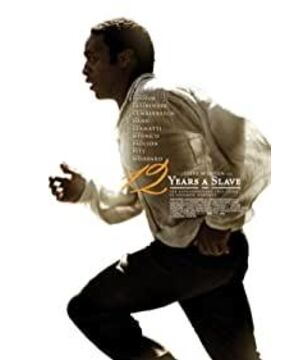In the final analysis, what has successfully impressed film critics and audiences is that he has reproduced a dark page in the history of American black slaves alive on the big screen, not as flamboyant as Quinton Tarantino's "Black Killing Order". Violence does not avoid the bloody and ruthless reality. Adapted from the experience of real characters, this passage has been abused many times, but it feels particularly heavy in this movie. In a memoir published in 1853, freelance black violinist Solomon Northup (Solomon Northup) records his 12 years of being kidnapped and sold as a slave in the South.
The movie basically follows the narrative in the memoirs. Solomon (Chiwetel Ejiofor played by Chiwetel Ejiofor) has a conspiracy and resistance from the beginning to the realization that in order to survive, he cannot bring up the fact that he is a free body. Platt, another name "given", is alive with another identity. Looking at Solomon, who had lost his freedom, was tortured and treated worse than animals, the audience in the theater felt like sitting on pins and needles, and could only hope that his pain would end as soon as possible. But as the name of the play says, the situation of twelve years is like forever, and there is nothing more uncomfortable for the audience.
Through Solomon, we have seen how stable the black slave system is under the dominance of commercial transactions, and how naked it is to show the ugliness of human beings. After removing humanity, there are only "goods" here. As Solomon's later owner Epps (Michael Fassbender) said, slaves are his property, and the law allows them, and they are taken out of context. The Bible is the basis of his behavior.
Epps are evil incarnations dressed in white skin, and other white people are not too much. Epps's jealous wife (Sarah Paulson) continues to target the black female slave Patsey (Lupita Nyong'o) who was "fell in love" by Epps; the carpenter Tibeats (Paul Dano) ) Because Solomon offered advice to his master, he was regarded as a thorn in the eye, and he was hanged by mistake; the trafficker Freeman (played by Paul Giamatti) was indifferent to the broken up black mother Eliza (played by Adepero Oduye) and his pair of children.
Is it the evil of human beings or the system that caused the scenes of cold-blooded errors? In fact, history keeps repeating itself. After Columbus discovered the New World, the Native Americans were slaughtered and forced into labor; African blacks were robbed and trafficked. The tragic history of the extermination of Jews by the Nazi Germans during the Second World War has also repeatedly appeared on the big screen. In modern times, there are the Red-Cambodia Massacre and the Cultural Revolution. Now let’s take a look at Syria. The drama of human oppression of mankind is constantly being staged.
As long as you have patience, you can always find the good side of human beings. There are also white people who sympathize with and help black people in the film. Some of them are weak and good people. Ford (Benedict Cumberbatch), Solomon's first manor owner, was sympathetic but was overwhelmed by the torrent of the times. Until Solomon met the Canadian Bass (Brad Pitt), Bass believed that people are created equal and spurned slavery. With the help of Bass, Solomon has a chance to regain his life.
The director upholds his rigorous visual scheduling. When Solomon is lifted from his neck and his feet just touch the ground, the picture stays in the telephoto lens: Solomon is struggling with slight movements, and the background is the beautiful Louisiana suburbs with beautiful trees and shadows. The black slave came out of the house, turning a blind eye to everything. In the beautiful world created by the Creator, human indifference is even more chilling. Steve McQueen also used a long lens to show the authenticity of violence in one go: Under the repeated pressure of his wife, the drunken Epps tied Patsey to a pole and ordered Solomon to whipped her without any editing. The camera continued to circle the pillar, while the whip was waved mercilessly, so that the audience had nowhere to escape during the entire torture.
Steve McQueen succeeded in restoring history without sacrificing the drama of the film. The black slave had no room for resistance, and the only thing that could truly convey his inner grief and anger was a pair of eyes. Pay close attention to the eyes of Chuyt Aizhiaofu and Leibi Daniangao, without saying more, their eyes have explained everything. Aizhi Offu is the soul of the whole movie. In fact, he has participated in a lot of movies, but it is not impressive. This time, there is finally enough role for him to play his acting skills. Niangao is a stage actor who won the Osborne Best Supporting Actress for his first performance on the big screen. Patsey's tragedy is more than Solomon, and it is indeed an unforgettable performance. Last but not least, Michael Fassbinda, who has worked closely with Steve McQueen, played the leading role in "The Great Hunger Strike" and "Humiliation". This time he plays the role of the owner of the alcoholic manor who has done all the bad things. His role is difficult.
In the end, Solomon represents the victory of mankind in fighting for freedom. Looking at certain Western countries that can accommodate movies that examine their own ugly history, it is not expected that countries that respect history but selectively forget their crimes are contemptuous. But is there really a country that is just? In fact, interests come first. As small individuals, we can't give up on ourselves, no matter whether it has benefits or not, as long as we act with our conscience.
Original: http://oscarkit316.blogspot.hk/2014/03/1212-years-slave-2013.html
View more about 12 Years a Slave reviews











